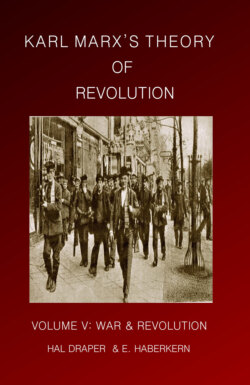Читать книгу Karl Marx’s Theory of Revolution Vol V - Hal Draper - Страница 9
На сайте Литреса книга снята с продажи.
3. Three Epochs
ОглавлениеLenin, apparently, felt all this was beyond dispute. His solution to this problem was to argue that Marx and Engels were dealing with a political and international configuration that was long past by 1914. They were dealing with a world dominated by the conflict between the bourgeois revolution and feudal absolutism. The world of 1914 was dominated by the competition of developed capitalist powers fighting over the division of the world’s markets and sources of raw materials.10
The first epoch from the Great French Revolution to the Franco-Prussian war is one of the rise of the bourgeoisie, . . . The second epoch is that of the full domination and decline of the bourgeoisie, one of transition from its progressive character toward reactionary and even ultrareactionary finance capital. . . . The Third epoch, which has just set in, places the bourgeoisie in the same “position” as that in which the feudal lords found themselves during the first epoch.11
Lenin repeated these themes throughout World War I and afterwards. It was his final word on Marx and Engels’ position; and, given this imprimatur, it has been accepted as a definitive, if perhaps oversimplified statement, of their views.
There is nothing wrong with Lenin’s schema in itself. Its virtue is that it provides a theoretical underpinning for the change in the attitudes of socialists towards war that followed 1871. But the difficulty is that Lenin claims he is expounding Marx and Engels’ views on war. And there is no evidence that this is so. If Lenin (or Kautsky or Potresov) thought they had such evidence they didn’t bother to exhibit it.
As an outline of Marx and Engels’ views on war and its relation to revolution, there are several problems with Lenin’s schema. Despite his repeated insistence, neither Marx nor Engels anywhere used the criterion “the success of which bourgeoisie is most desirable.” From the time of their earliest writings on the subject, both men saw the dynastic imperialism of the absolute monarchies as the main cause of war in Europe. This relic of the medieval, pre-bourgeois past, naturally, led to wars between the dynasties themselves over the division of the continent into spheres of influence. More important, however, was the military threat the dynasties, especially the Russian one, posed for any renewed revolutionary activity after 1815. It was the conflict between the old world of feudalism and the new world of the bourgeois revolution that was the real source of war. Not only did neither Marx nor Engels ever use the phrase “the success of which bourgeoisie is more desirable,” the concept cannot be found in their writings, public or private. When conflict between the bourgeoisie and the old order broke out in either domestic or international politics, they tended to urge the bourgeoisie forward. At the same time, because of their experience in 1848, they expected the liberal bourgeoisie would shrink from any serious confrontation. On a number of occasions, they tended to accuse liberals of what we today would call “appeasement” in the face of Tsarist, Bonapartist, or Hapsburg provocations.
Lenin, himself, in the very articles quoted here, recognizes that what characterized his “first epoch” was just this conflict between the old order and the new. His insistence on the formula “the success of which bourgeoisie” can only be explained by his eagerness to enlist Marx and Engels on his side in the contemporary dispute over World War I which, in his view and that of most other opponents of the war, was a conflict between states where the bourgeoisie was effectively master.
